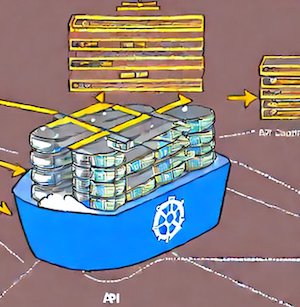Improve MMTests Comparisons and Reportinga project by vbabka The Proposal |
Cloud rearrangement: VM migration path-findingan invention by aspiers There are several use cases where it's beneficial to be able to automatically rearrange VM instances in a cloud into a different |
Moses machine translation performance tuninga project by marxin Moses is a statistical machine translation system that allows you to automatically train translation models for any language pair. Intention of the project is to tune up existing software, where a glimpse shows that majority of time is consumed by memory allocation, dynamic casting and other calculation non-related stuff. I would like to inspect many techniques (like perf profiling, GCC LTO, GCC profile-guided optimization, code refactoring, OpenTuner, etc.) which may bring really significant performance gain. Moreover, it would be really beneficial to come up with a cookbook that can be used by folk in general. If possible, I would like to create a step-by-step performance improvement graphs. |
Go async (and non-blocking) with HTTP requestsa project by j_renner There is a couple of libraries available for asynchronous and non-blocking processing of HTTP requests (in Java) that can be used to avoid having threads waiting for responses in request intensive applications, for example: |
|
OpenBLAS: test performance on AMD Zen2 and learn more about the implementationan idea by marxin OpenBLAS is a high-performance linear algebra library that's implemented mainly with vector instruction directly written in assembly language. |
Phoebe - where AI meets Linuxa project by mvarlese Project Description |
Git stochastic bisectiona project by jankara Bisection is a well known method of localizing which commit caused a regression in a code repository. git-bisect is a particularly used tool for this problem in git repositories. However it is often the case that the failure is probabilistic in nature - either because we don't have a reliable reproducer of the failure and thus not reproducing a problem on a particular commit does not mean the problem is not still present there, or because of inherent variability of e.g. performance regressions. Bisection for such failures is problematic as it takes only one false result for the bisection to end up in an unrelated part of code history. So in these cases we usually have to heavily extend runtime of a reproducer or do multiple test runs or multiple bisection runs to minimize a chance of error. |
|
Visualization of historical sar(1) archivesa project by ggherdovich Project Description |
Investigate zypper/openSUSE repository refresh optimisationsan invention by dirkmueller |
|
dynticks-testing: analyse perf / trace-cmd output and aggregate dataan invention by m.crivellari Descriptiondynticks-testing is a project started years ago by Frederic Weisbecker. One of the feature is to check the actual configuration (isolcpus, irqaffinity etc etc) and give feedback on it. |
